Powerful Womxn Who Are Changing The World: Genein Letford

Aspart of my series about “Powerful Womxn Who Are Changing The World”, I had the pleasure of interviewing Genein Letford, who is an Intercultural Creativity Keynote, Author, and Trainer. She got her start and found her passion for intercultural creativity work when she was working with young children, promising teens, and C-suite executives all at the same time and saw how her work could impact the world. Genein has woven together financial wellbeing, creativity, and inclusion into her work to create a truly important concept that she believes will change the world.
I am thrilled to highlight Genein Letford and the amazing work she is doing through her organization!
As the 2019 LA Lakers Business Woman and the 2015 CA Charter Teacher of the Year, Genein is a national thought leader and creator of the concept of ‘Intercultural Creativity™’. She is the Founder and Chief Creative Officer of CAFFE Strategies, LLC which trains C-Suite executives and employees to create sustainable organizational equity and inclusion strategies while unleashing their innovative thinking for themselves and in their businesses. Her 7 Gems of Intercultural Creativity is a leading framework that encourages corporations in their diversity and inclusion development while developing critical cognitive tools for creative thinking.
Her first book, From Debt To Destiny: Creating Financial Freedom From the Inside Out connects creative thinking to financial agility and was an international bestseller in 5 finance categories. Genein believes creative thinking thrives best in an inclusive environment and she is often called ‘America’s Creative Coach’ for her work in reigniting intercultural creativity within our workforce.
Thank you so much for taking the time to catch up with me! I’ve been so inspired by you and the work you’re doing. Tell us a bit about what you are focused on.
We are in a shift right now. Creativity thinking is now the #1 skill needed in the workforce, and this workforce is now global. People may not know that creativity is a skill, and this skill can be developed. But there’s no use in growing your creativity if you’re working in a non-inclusive environment where your ideas are not valued. That’s why I decided to research inclusion and intercultural competence which gives people the ability to work with people from various cultures and lived experiences. Creativity needs inclusivity and inclusivity needs intercultural competence. Both areas need to be developed simultaneously. That’s where my work comes in called Intercultural Creativity™
What do you love about it?
Creativity is all about connecting the unconnected. At CAFFE Strategies, our logo is the diamond. So I called it ‘Connecting the Diamonds’ and that’s exactly what happened here. It was my ‘aha’ moment — and who doesn’t love an ‘aha’ moment? EUREKA!! Both creative thinking and intercultural development sit upon the same skills: Open Growth Mindset, empathy, skilled observation, curiosity, perspective-shifting, connecting between commonalities and differences, and having the courage to connect, share and create. So my specialized curriculum trains the creativity skills and then transfers them to intercultural development. We also work on organizational creative culture to support the continued development of these skills. I love that this is my unique gift to the world and that it will help our clients reclaim their creative spirit while working in unification with people from various backgrounds.

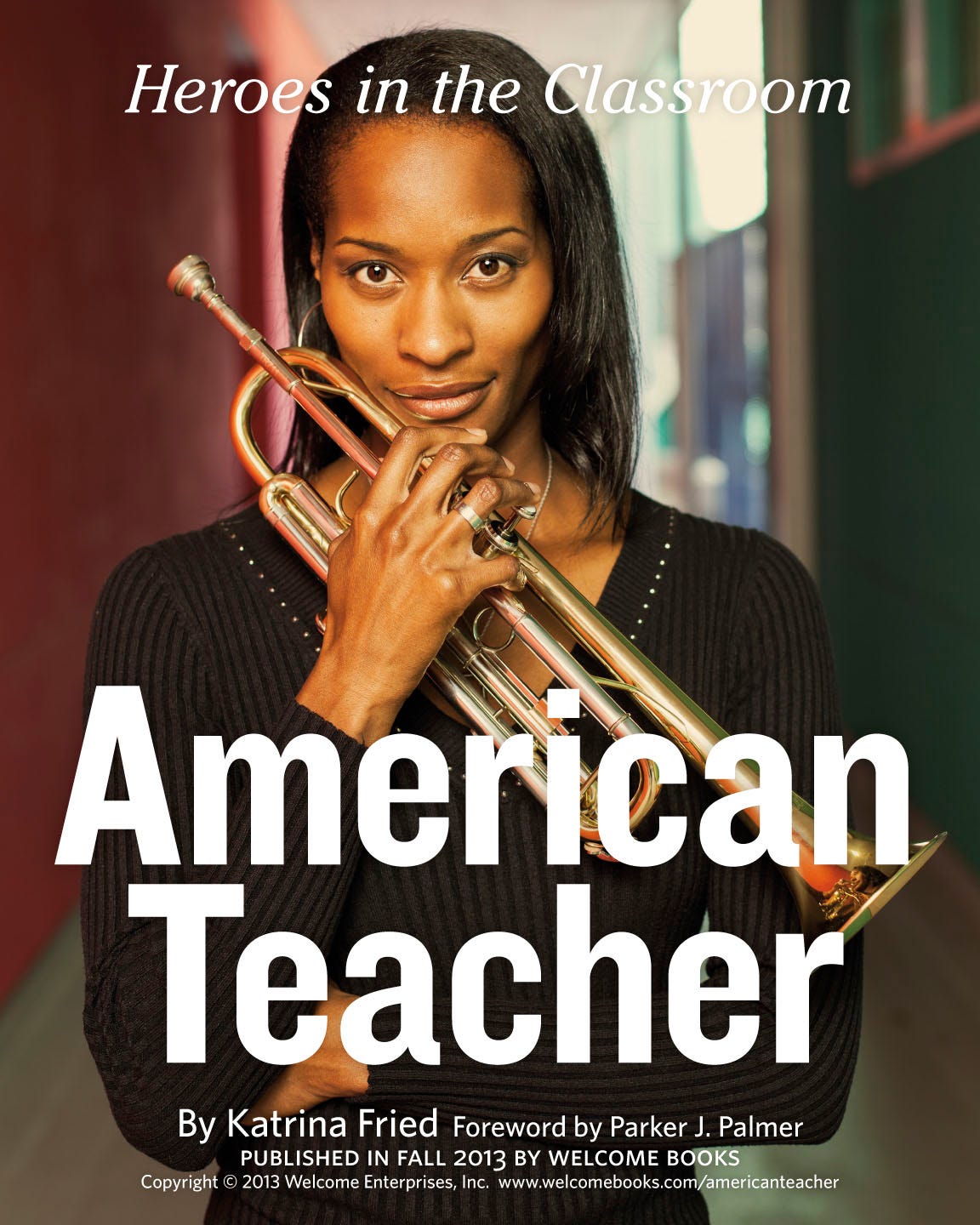
Why is this work important to you?
The stats are clear, World Economic Forum listed creativity at the top of the list of most needed skills. Even before the pandemic hit, creative thinking was high in demand because of the exponential advancement of technology. Now in this work climate, it is a must-have. My trainings go beyond the inspirational ‘Be Creative’ keynote and really help people develop the cognitive creative thinking they need to think expansively and effectively. We then connect those creative skills to develop the intercultural skills needed to create and innovate with others. It’s a seamless transition that empowers people to be confident with growing themselves and their relationships. If people don’t feel valued and heard in the workplace, they’re going to leave. According to an Accenture report, the annual cost to companies as a result of having to replace employees is over $64 billion. Equity equals innovation.
How did you get into this?
Helping four-year-old children clap on the beat was how I started my career. I then found myself also running a non-profit for 6th-12th graders, teaching night classes at the local university, and sitting on a non-profit board with high-powered executives. So in the same week, I was interacting with a kindergartener, then a promising teenager from a low-income area, and then I found myself sitting with a CEO who runs a billion-dollar company. I was shifting cultures day by day, hour by hour. Those positions required me to adapt and shift cultures quickly as well as think creatively. I understood how much intercultural creative skills were critical to managing and building relationships in various environments and with people with different lived experiences.

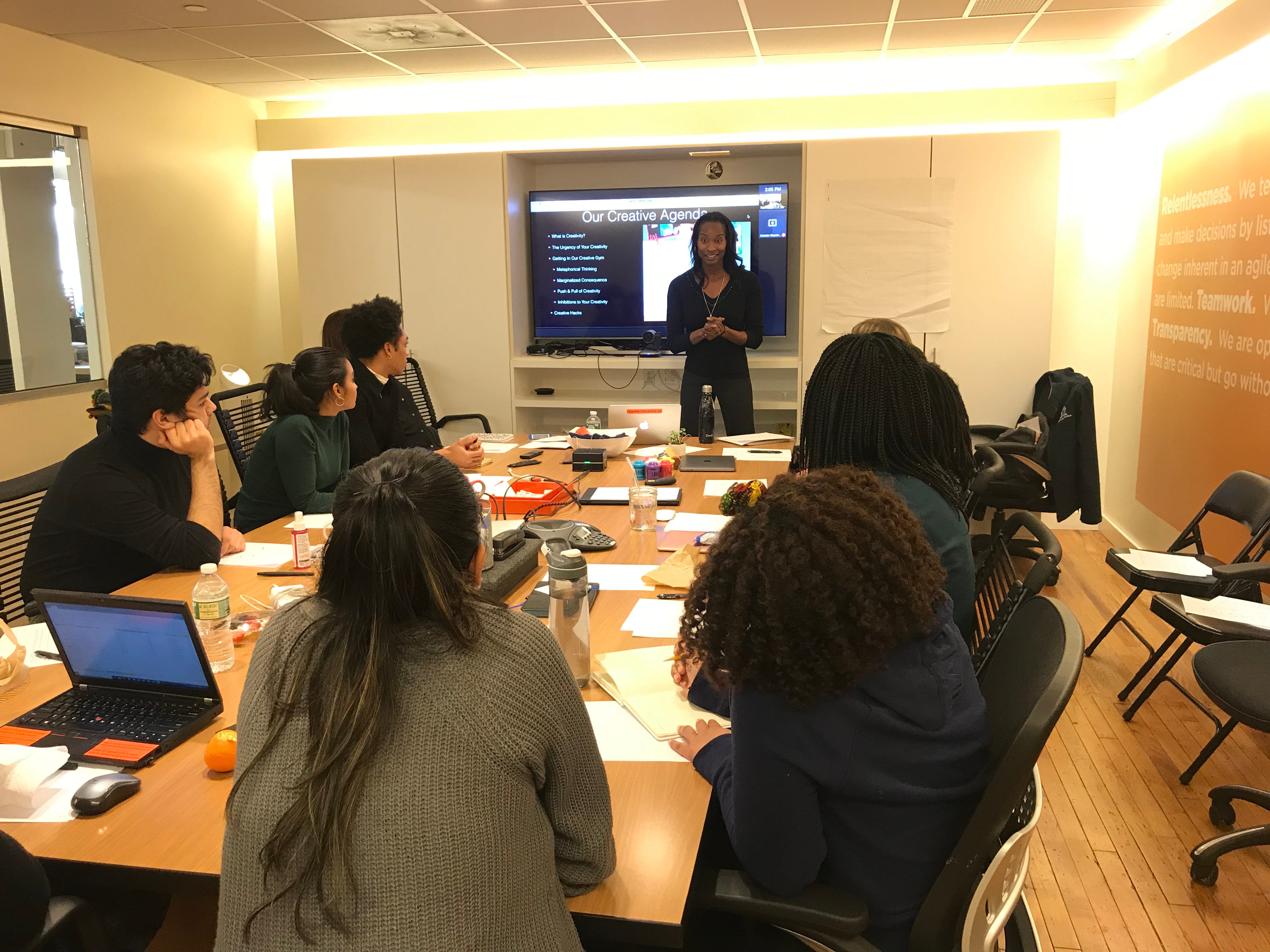
What do you think makes you amazing at what you do?
Having the unique perspective I have with working through the entire pipeline (K-12 to workforce to C-Suite) plus my background in psychology, training, and curriculum development puts me in an advantageous position to see what others may miss. I teach and train in a unique way involving the whole body, brain, and emotional abilities to teach intercultural creative concepts for true behavioral change. My clients truly feel empowered to show up in their full creative capacity and equipped to connect with others while having a strategy to build a culture of inclusion.
What is the most challenging part of your work?
I have taken on the challenge of redefining creativity for us all. Let’s face it, the term creativity was hijacked by artists. There are people working in our organizations who think they are NOT creative because they are NOT excellent in the arts. This just isn’t so. We are all born with the cognitive skills creativity thrives on, such as observation, curiosity, exploration, functional agility, perspective-shifting and combining unassociated concepts. Creativity is a skill and skills can be developed. So yes you are creative! Helping organizations create an inclusive culture where creative thinking and curiosity is celebrated is the focus of my work.

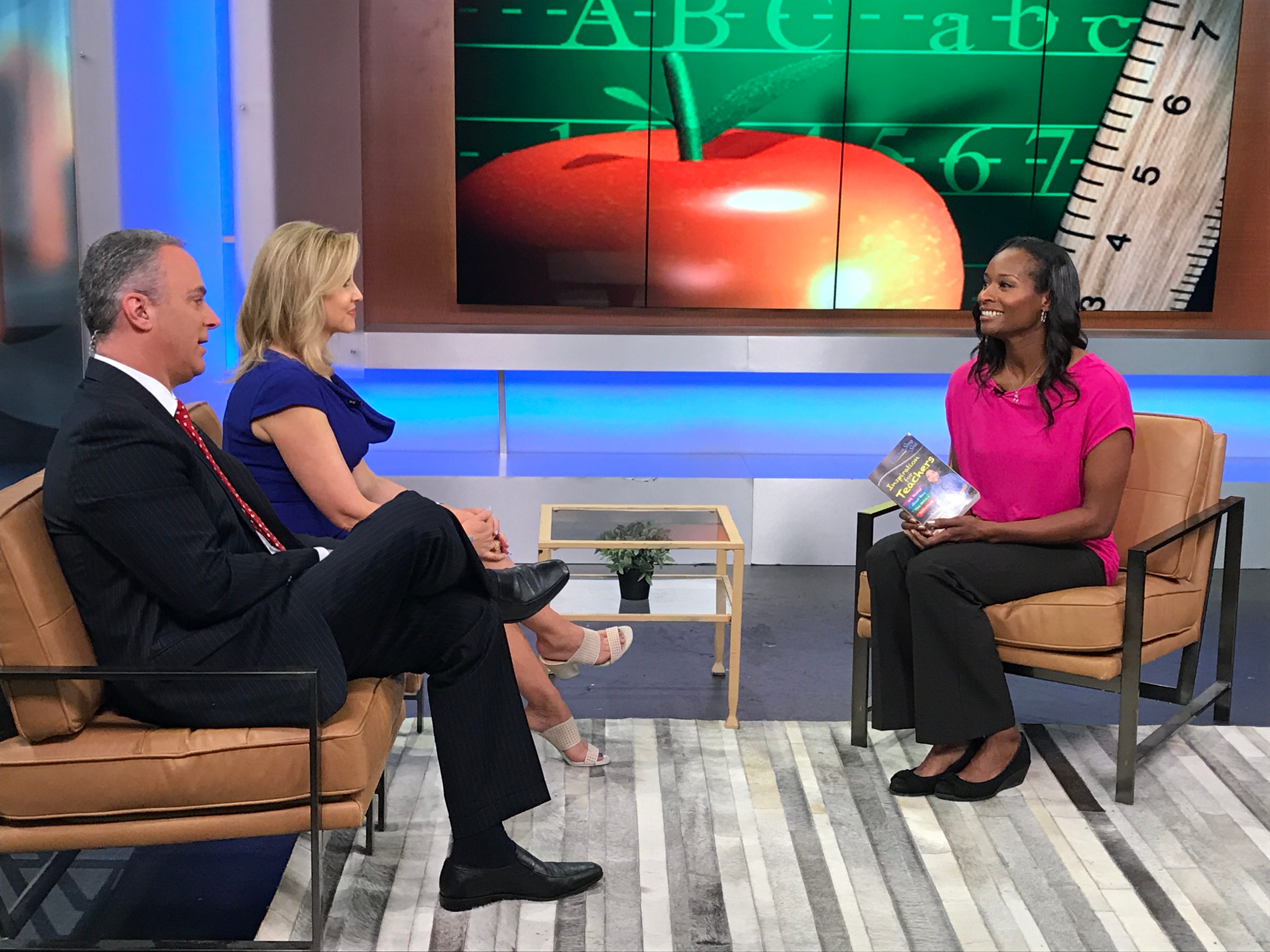
What problems keep you up at night?
You know that feeling that you have a really good idea and your mind is racing because you can’t seem to stop thinking about it? Well, that is what Intercultural Creativity™ does for me. I think of all the people who aren’t living up to their creative potential either because they have let their skills atrophy or they are in a company culture that won’t let them express their authentic self, that keeps me up at night. We are losing so much value and innovative ideas due to this creative conundrum.
When you were a kid, what did you want to be when you grew up?
Clues. I was always looking for clues. Clues about life, school, and why things were the way they were. I was always wondering ‘Why?’ My mother, seeing my interest in discovery, purchased a detective kit with reflective glasses, a fingerprinting kit, and a clue notebook. My favorite books were Encyclopedia Brown, a collection of stories about a kid detective that solved neighborhood crimes. Even though I always wanted to be a teacher, I had this fascination for connecting the dots and figuring out the mysteries of life. This has stayed with me well into adulthood and I tell people it feels like I’m in a ‘Diamond Escape Room’ and life is leaving a bunch of clues about the mystery of the universe.
If you could talk to your younger self, what would you say?
I often ask this question in my trainings because doing this is a creative skill called ‘Fictive Learning’ when you create alternative outcomes to past events. I actually wrote an open letter to my 18-year-old self and posted it on my blog. It was an emotional experience because I wanted her to know that her ideas have value even though she struggled to communicate them. I’ll tell her that things end up working out in the end. Just keep moving forward. Your ideas have value and one day you’ll be able to share them with the world. That day has come.

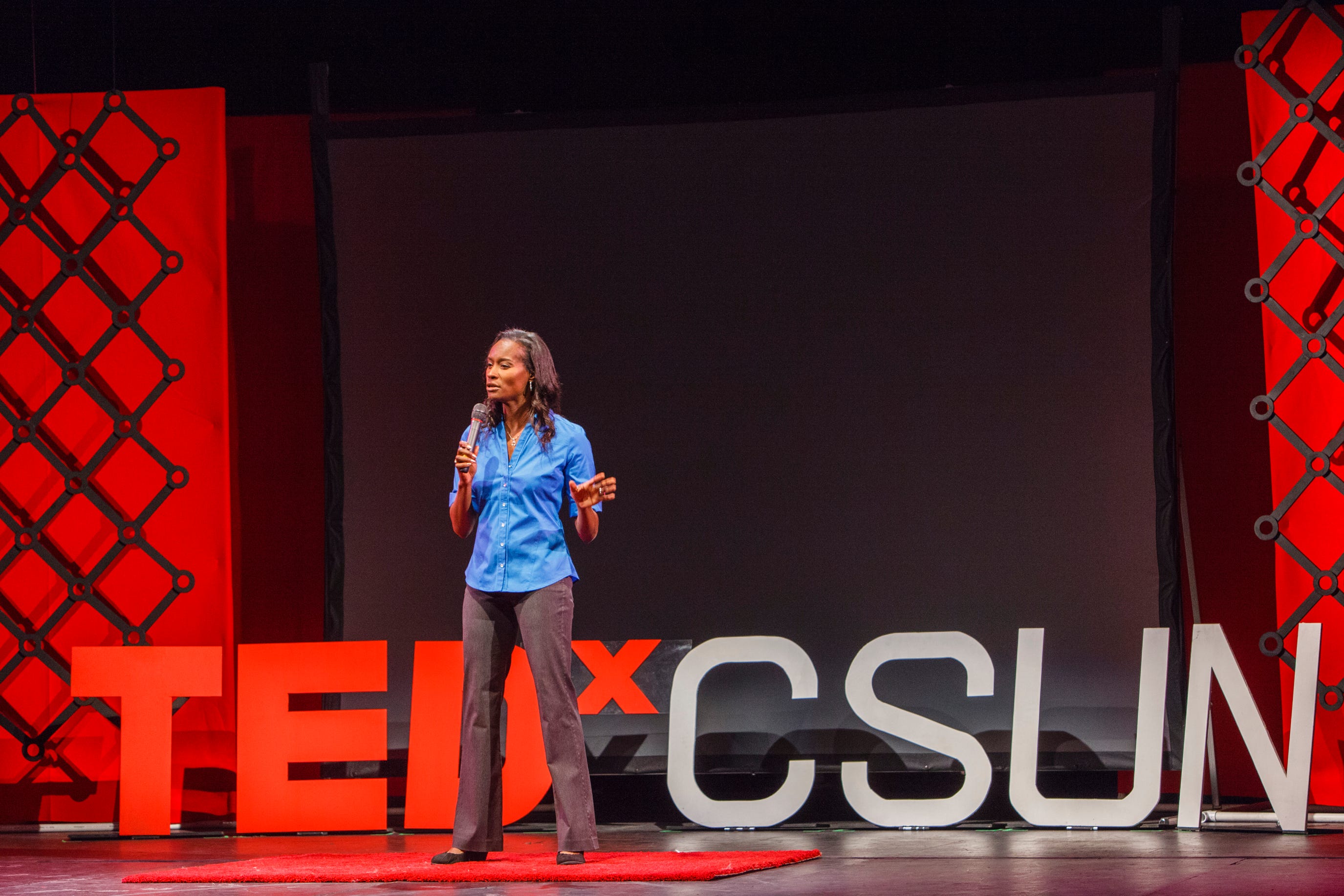
Who is one of your heroes and why?
This may sound like a common response but my hero is my mother. The level of intercultural creativity that my mother knew to raise us with was astounding. She intuitively knew the importance of putting her children in new, and sometimes uncomfortable, experiences, to grow our intercultural development. She also understood the importance of giving us training in the arts because it would help us in our ‘non-artistic’ professions. She made sure we stimulated our senses and not just our intellect. It paid off. My brother, Joseph, works for NASA and just helped send the rover to Mars. My twin sister Genae is a scientist and my little sister, Genette, is an award-winning nurse. She built a culture of intercultural creativity in our home which made all the difference.
What is one of your superpowers?
When I was young I had to go through years of speech therapy. Not being able to communicate your ideas fluently does a real number on your identity. I struggled but eventually, with practice and commitment I made it to the TEDx stage to offer my idea worth spreading. So now my superpower is reframing my experience with stuttering and I now see how it made me a stronger, more resilient person. If I can get on the global stage to advocate for creativity despite a speech impediment, you overcome your struggles as well!
What is your best professional advice for someone wanting to level-up and follow their dreams?
If you’re looking to go to the next level in your profession and in life, be aware of whom you surround yourself with. There’s a term called ‘Social Contagion’ that describes how courage, creativity, and even fear can be transferred from person to person. Surround yourself with people who create, execute and encourage you to do the same. Start building your board of directors (mentors) and your tribe (peers) before you actually need them. Community and collaboration are so important.
What is one of your favorite quotes, and what does it mean to you?
‘Do what you can, where you are, with what you have.’ Theodore Roosevelt. This quote embodies the creative spirit because it forces you to use the resources you have creatively. It takes away excuses and motivates me into action!
When you aren’t working, what do you enjoy doing?
I’m usually singing Karaoke or dancing with my son. Since I study and create curriculums around creative thinking, I’m always ‘working’ because I observe how a true creative genius, my son, solves problems throughout his day. He teaches me how to be expansive, imaginative and curious. I love exploring the outdoors and seeing the world through a three-year-old’s eyes. To be able to stare at a snail for ten minutes is something I would not normally do on my own but with him, it’s our favorite pastime. We live in the world of awe. The world is his classroom and nature is his teacher. And I’m bringing these timeless and foundational lessons back to you and your organization.
I believe there is power in sharing our big dreams and audacious goals. What’s one of the biggest dreams or goals you have?
My biggest dream and goal is to be a global trainer and speaker on ‘Intercultural Creativity™’ and train organizations and other trainers to empower people to connect, create and innovate with people across cultural lines.

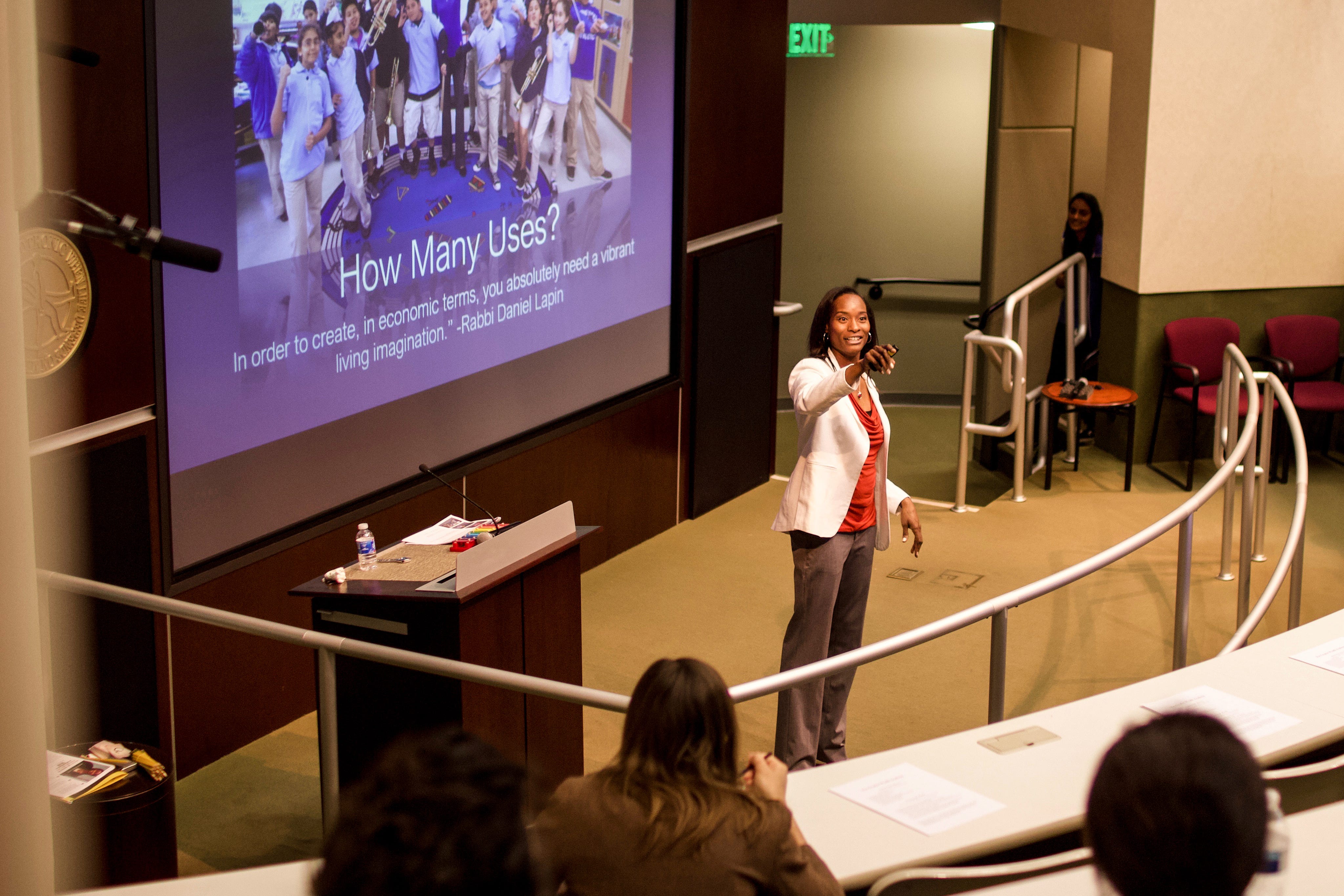
Just for fun:
- What non-essential item are you taking with you to a desert island? Watermelon Bubble Gum
- Go to or favorite TV show or movie: The Color Purple — My sisters and I know ALL the songs and ALL the lines!
- Favorite book: Right now, The Leader’s Brain by Dr. Michael Platt about the connection between neuroscience and creativity.
- Something you’re terrible at: Delegating. I love to do everything but now that I am leading a company, I have to hand things off!
- Favorite cuisine: An ethnic cuisine I haven’t yet tried!
- Biggest fear: Leaving this earth with my creative gifts and books still inside of me
- Karaoke song: I LOVE karaoke — Ike and Tina Turner’s ‘Rollin’ On the River’ is my song! I have a full stage show with my siblings!
- Guilty pleasure: Butter Pecan ice cream in the middle of the night.
- Pet peeve? Ghosting People. If you don’t need services, that’s ok. Just send an email stating so. Let people move on.

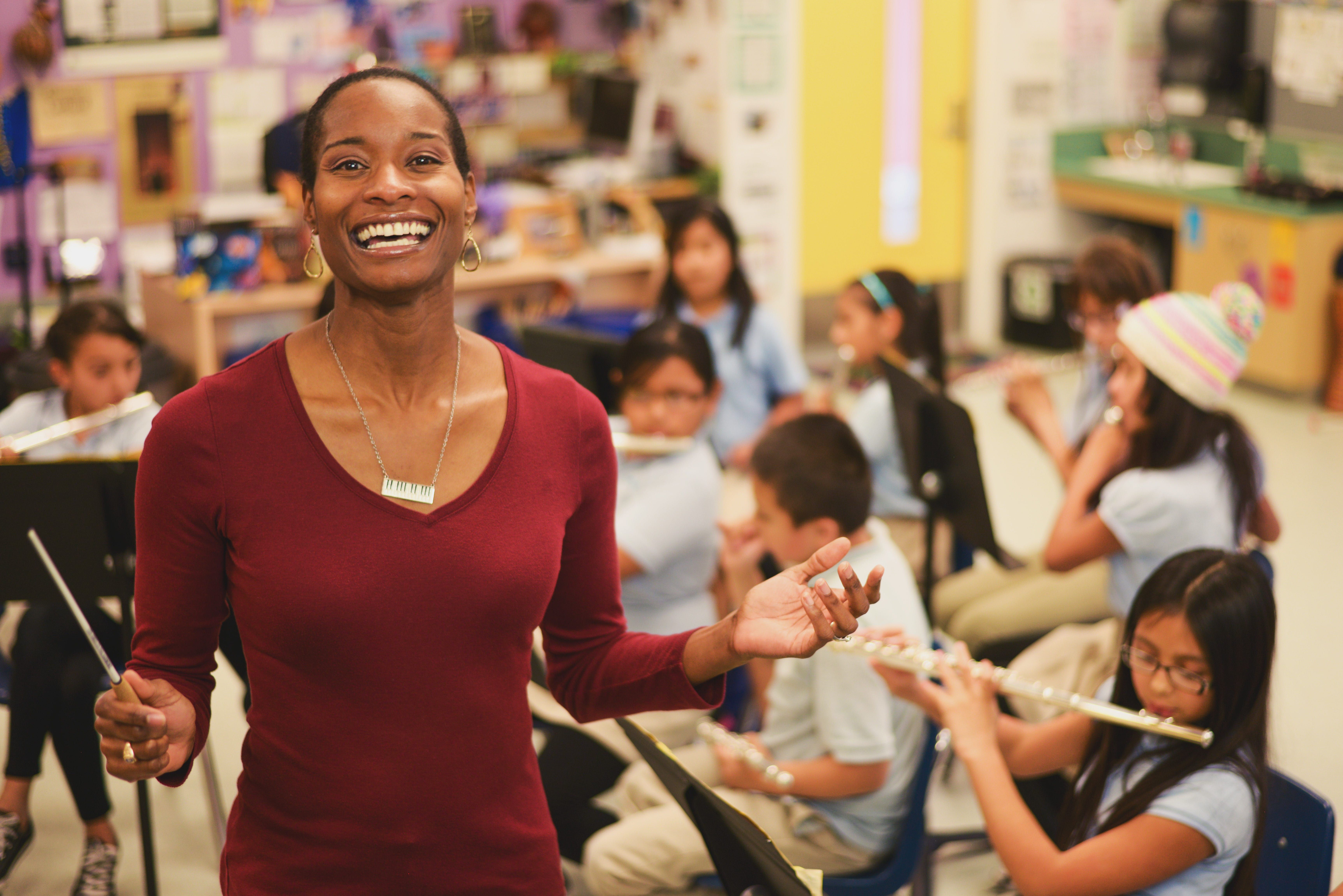
What does being a powerful womxn mean to you?
‘With great power comes great responsibility!’, yells out my son, as he keeps running around the house with his Spiderman bubble thrower. I laugh at him but am realizing how profound that statement is. Being a powerful woman means you are aware of yourself, of others, and the journey. You realize you did not make it to this level alone and are responsible for helping others, especially those who do not have access to mentors and sponsors.
Now my favorite question: How are you hoping to impact the world through who you are and what you do?
Ideas can change the world and the idea of ‘Intercultural Creativity™’ will be one of them. This idea will change how we educate our youth and retrain our workforce. Helping people understand what it means to think creatively and allowing them to fully develop and manifest this skill in an inclusive environment will be a game-changer for our nation and our world.
How can we support you / your organization / your goals?
I would love to get the word out about the timely importance of ‘Intercultural Creativity™’ to as many organizations and senior leaders as possible. Our Diamond Diversity Program is a fully comprehensive creative D&I program that offers assessments, data collection, and training for cognitive, skill, and behavioral transformation. Thank you for allowing me to share my story and be a solution. Blessings.
Connect / Follow / Support:
CAFFE Strategies, LLC https://caffestrategies.com/
https://www.linkedin.com/in/genein-letford-b17b9973/
https://www.facebook.com/GeneinSpeaks/









